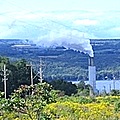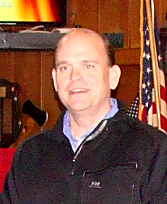- By Dan Veaner
- News
 Print
Print  Unless another extension is granted the fate of the Cayuga Power Plant will likely be decided within a month. Last month the plant was given a stay of execution when the New York State Public Service Commission (PSC) extended the coal-fired plant's Reliability Support Services Agreement until June 30, 2017. But unless the State decides to repower the plant with natural gas its days are numbered. Perhaps because of the uniform local support for the repowering of the Dunkirk plant, the Cayuga plant's fate is anyone's guess because of mixed support within Tompkins County.
Unless another extension is granted the fate of the Cayuga Power Plant will likely be decided within a month. Last month the plant was given a stay of execution when the New York State Public Service Commission (PSC) extended the coal-fired plant's Reliability Support Services Agreement until June 30, 2017. But unless the State decides to repower the plant with natural gas its days are numbered. Perhaps because of the uniform local support for the repowering of the Dunkirk plant, the Cayuga plant's fate is anyone's guess because of mixed support within Tompkins County."The difference is that in the community of Dunkirk in that area of Chautauqua County, they were united in one voice that 'we want that plant'," says U.S. Congressman Tom Reed. "And now what we're hearing and the message getting up to Albany and the other powers that be, is that there is a split in that message where a lot of folks are saying, 'no, we don't want it to be repowered and stay in existence.' To me that's problematic."
When plant and NYSEG officials were directed to submit proposals to the PSC last year NYSEG presented its own plan to upgrade the power delivery grid and close the plant. Plant officials submitted four proposals, the least expensive of which they said could save ratepayers money. The PSC was originally set to rule on whether or not the plant would be closed at the end of last year. Instead an extension was granted to see if plant and NYSEG officials could agree on a new proposal. At the end of December the PSC granted a second extension, giving the two companies until February 28th to come up with a mutually agreeable proposal that includes converting the plant from coal to natural gas.
Governor Andrew Cuomo announced in December the Dunkirk plant would stay open when NRG, other energy suppliers and the New York Power Authority came to an agreement. $150 million will be invested in upgrading the plant, which officials said would save almost 70 jobs and and provide 50 new construction jobs during the construction.
If the Lansing plant closes it will mean lost jobs, lost local spending and a significant tax increase for Lansing property tax payers. State Senator Mike Nozzolio argues that the average property taxpayer would see a $600 increase, and Lansing School Business Administrator said that over the long haul the cost could be higher still. Property owners have already seen their taxes rise as a result of the decreasing taxable value of the plant. Lansing representatives have been almost uniformly in favor of a repowering proposal, from Town Board members to Lansing's representative to the Tompkins County Legislature, Nozzolio, and Reed.
 Congressman Tom Reed talked to the Lansing Star about the Cayuga Power Plant proposal while visiting Candor last Saturday"To me this is a critical issue for the area and the community," Reed says. "We're going to continue to weigh in to keep that plant there. I think repowering is a common sense solution to the issue, and we'll keep doing our part to make that known."
Congressman Tom Reed talked to the Lansing Star about the Cayuga Power Plant proposal while visiting Candor last Saturday"To me this is a critical issue for the area and the community," Reed says. "We're going to continue to weigh in to keep that plant there. I think repowering is a common sense solution to the issue, and we'll keep doing our part to make that known."Officials and private citizens outside of Lansing oppose repowering with natural gas, but say they would support repowering with renewable energy. But Goodenough and others confirm that the only repowering issue the PSC is considering is natural gas. Even the strongest proponents of repowering with gas argue that is it an interim solution until renewable technologies are developed to the point where they are viable for generating energy on the scale needed.
"As you heard the President say in the State of the Union, natural gas is taking the energy of our immediate short term and near future," Reed says. "That's the solution, so to go down these other paths, to me, is something that complicates the solution that we need to get to. When you look at my opponent (Martha Robertson is challenging Reed in the upcoming election), who says she would like to see it stay, but as biomass -- that's been studied. That's not going to be a long term solution to this situation, and to go down that path just sends a conflicting message."
Before the extension was granted Lansing Supervisor Kathy Miller encouraged town citizens to call the Governor's office to express as much support for the repowering plan as possible, to illustrate that even with conflicting opinions county-wide, support for the plant is uniform within the township. Reed says that he will continue to to let Albany know he is in favor of repowering the plant.
"We have weighed in with Albany and with the PSC. We have weighed in with the entities that are negotiating the power purchase agreements. We're very supportive and we want to do what we can at whatever level to make that deal come into existance, get the plant repowered and stay in the community."
For the State the decision seems to come down to three issues: a viable plan that is agreeable to both companies, a plan that will not cost too much in electric rate rises, and local support. The extension for developing a plan also means more time for people to call the Governor's office to help him gauge the level of local support. The fact that the PSC has granted two extensions for the express purpose of allowing plant officials and NYSEG to come up with a mutually agreeable proposal seems encouraging for repowering supporters. Upstate New York Power Producers CEO Jerry Goodenough says he is optimistic that they will come up with a proposal the PSC can accept. But the battle isn't over until Cuomo announces the final decision, possibly in March.
"We got Dunkirk. We got very good news," Reed says. "They're going to keep that plant. We're very excited about that. So now, hopefully we'll get some good news out of the Lansing Cayuga operation. We can do this safely. Let's get this power plant up and keep it."
v10i5



